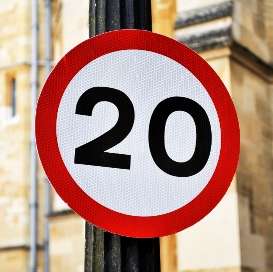Research shows British ready for 20mph limits, but need police support

Nancarrow of UWE Bristol's Social Marketing Centre have analysed the results of a recent YouGov survey of Great Britain and concluded that although support is strong for 20mph limits in residential areas and busy streets, enforcement by the police will be needed to confront the driving of a minority.
A recent YouGov survey of Great Britain has found a clear majority of support for 20mph speed limits in residential streets (65% support or strongly support) and busy shopping areas and busy streets (72%). When asked for reasons to support 20mph limits, perhaps not surprisingly road safety and children's safety are where the public's collective priority currently lies, with other reasons - such as making our streets more pleasant to live in, encouraging more walking and cycling, reducing noise and improving the quality of life receiving less support.
With one-fifth of the UK already within 20mph limits or with firm plans to do so, and more large urban areas to follow suit, these findings are encouraging for local authorities wishing to promote the idea of reduced speeds in busy urban settings. On the issue of the level of support amongst different demographics Professor Clive Nancarrow of UWE-Bristol's Social Marketing Centre said, "We found a higher level of support for 20mph in residential areas amongst women and older age groups. Interestingly there was also an association with voting intention, with a higher level of support for 20mph limits amongst Green (75%) and Labour voters (70%) and a lower level of support amongst Conservatives (60%), UKIP (60%) and Lib-Dems (63%)."
But will motorists obey the new limits? Professor Alan Tapp, also of UWE Bristol, reports a divide in attitudes. "While a majority of drivers, 64%, agree that they 'will be careful to observe new 20 mph limits wherever they are', nevertheless a minority, 31%, say 'If a 20mph speed limit is introduced, I may not stick to it'. Other data may provide clues as to why this divide exists. For instance almost three quarters (73%) of adults in GB agree that breaking speed limits is not acceptable in most circumstances and nearly two thirds (59%) of GB adults think most people drive too quickly. But on the other hand 28% of drivers agreed 'I use my own judgement, not speed limits, to decide on my speed on the road', while 49% thought 'It is just too difficult to stay at 20mph'. Almost a third of people (30%) thought that 20mph is an example of a nanny state; and a small minority (7%) demonstrated their libertarian beliefs agreeing that 'I think people should be free to drive at whatever speed they want to.
"Apart from these divides in attitude, local authorities and 20mph supporters need to also be aware of a possible 'vicious circle' effect, in which those who want to comply with the new limits may be put off from doing so because they are affected by the driving behaviour of others: 37% of drivers said they 'tend to drive at the speed of others on the road'. This 'copycat effect' may be compounded by a feeling amongst the large majority - 71% of drivers – who agreed that 'people will ignore 20mph limits because they don't see themselves getting caught by the police'. That's why clear and unequivocal police support for 20mph limits would be very welcome for those who want a new culture of driving at slower speeds in built up areas."
Provided by University of the West of England




















